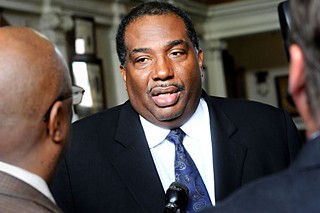Criminal Justice: Mercy at the Margins
Small changes proposed in state criminal laws
By Chase Hoffberger, Fri., Jan. 9, 2015
Texas is one of only ten states that will try, sentence, and incarcerate someone as an adult as soon as they've celebrated their 17th birthday. There's a current run of (undoubtedly optimistic) bills on the books to change that: House Reps. Ruth Jones McClendon, D-San Antonio, Gene Wu, D-Houston, and Sen. Juan Hinojosa, D-McAllen, each have filed bills (HB 53 and 330, SB 104) intended to raise the age of adult culpability to 18.
The Houston Chronicle reports reflexive opposition from Sen. John Whitmire, D-Houston and chair of the Senate Committee on Criminal Justice. His reasoning: by 17, you should understand the repercussions of your actions. Whitmire has his own bill, SB 108, designed to eliminate the restriction on how many offenses a minor can have expunged. [See correction below]
The bulk of the early criminal justice bills could be construed as defendant friendly – starting with four bills designed to help prevent wrongful convictions. Sen. Rodney Ellis, D-Houston, would create SB 81, a 15-member commission designed to identify areas needing improvement in statutes, rules, and procedures within the criminal justice system; Rep. McClendon's HB 48 is the House companion. Regarding the current push for law enforcement body cameras, Sen. Royce West, D-Dallas, and Rep. Ron Reynolds, D-Missouri City, have filed bills (SB 158 and HB 474) that would require certain officers to wear cameras.
In reaction to county video-visitation policies (see "Through a Glass, Darkly," Nov. 7, 2014), Whitmire has filed SB 231, that would preserve face-to-face non-contact visits in county jails. Hinojosa's SB 99 would provide counseling and substance-abuse treatment to parole-eligible inmates nearing their dates of discharge.
There are also a number of early bills that would reduce the consequences for minor drug offenses. Rep. Harold Dutton, D-Houston, has long worked this territory: his HB 403 would reduce the charge for possession of less than one gram of certain controlled substances (for first-time offenders) from a state jail felony to a class A misdemeanor, and his HB 414 would drop the charge for possession of an ounce or less of marijuana to a class C misdemeanor: maximum sentence $500 and no jail time whatsoever. (And though he hasn't done so yet, we can expect Austin Rep. Elliott Naishtat to file a bill – once again – to legalize medical marijuana.) Wu has also filed a bill (HB 325) that would make any amount less than the apparently arbitrary standard of .35 ounces a class C misdemeanor (so long as it's not found within 1,000 feet of a school).
Moving in the opposite direction is Lubbock Republican Sen. Charles Perry's SB 199, which would more tightly prohibit the possession of synthetic drugs.
On capital punishment: Ellis' SB 226 would bar the death penalty for those with intellectual disabilities. A string of high-profile cases this year – dramatically highlighted by the December stay for schizophrenic death row inmate Scott Panetti – re-emphasized the importance of progress in this area.
An earlier version of this story incorrectly stated that Whitmire’s SB 108 will make it more difficult for minors to be exonerated from crimes they did commit. In fact, the bill would eliminate the restriction on how many offenses can be expunged.
Got something to say on the subject? Send a letter to the editor.















